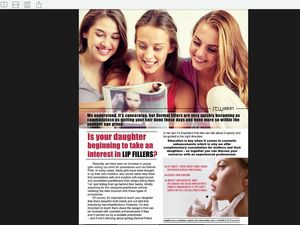‘Irresponsible’ ad for lip fillers banned
The ad for Royal Tunbridge Wells Skin Clinic said dermal fillers were becoming ‘commonplace’.

An ad for lip fillers has been banned for irresponsibly presenting the procedure as normal and safe.
The ad for the Royal Tunbridge Wells Skin Clinic (RTWSkin), published in Index Magazine in October, featured a photo of three young women looking at a magazine together and stated: “We understand, it’s concerning, but dermal fillers are very quickly becoming as commonplace as getting your hair done these days and even more so within the younger age group.”
It went on: “Is your daughter beginning to take an interest in lip fillers? Recently, we have seen an increase in young girls visiting our clinic for procedures such as dermal filler. In many cases, these girls have been brought in by their own mothers, who would rather help them find somewhere safe and suitable with experienced and accredited practitioners than simply telling them ‘no’ and letting them go behind their backs, blindly searching for the cheapest practitioner without realising the risks involved with these types of procedures.”
A reader complained that the ad was irresponsible for encouraging children to undertake cosmetic procedures and by undermining their body image.
RTWSkin said a 20-year-old member of staff suggested and wrote the ad after becoming aware of concerns among her age group about poor outcomes from treatments carried out by untrained and inexperienced therapists.
Of those consulted as a result of the ad, approximately 30% had gone ahead with treatment, which RTWSkin described as minimal and subtle, with the rest being given information to make an informed decision.
RTWSkin supplied a statement by the author of the ad, in which she said she believed her peer group to be particularly vulnerable to the messages put out by reality TV shows and social media, and believed education and discussion of the subject was important.
The Advertising Standards Authority (ASA) said the ad created the impression that the risks of lip fillers were associated only with procedures carried out by unsuitable practitioners, that it was normal for teenagers to correct perceived imperfections with lip fillers and that, due to their growing popularity, the only choice for parents was between supporting their daughters in seeking treatment from a clinic like RTWSkin or leaving them to undertake the procedure themselves somewhere else.
While the ad warned against going to unsuitable practitioners, it made no reference to the risks that would always be attached to lip filler treatment, wherever a customer went for it, the regulator added.
It said: “We considered that, by presenting lip fillers as normal and safe if carried out at the right clinic for young women and teenagers, and something that responsible parents should support, the ad was irresponsible.”
RTWSkin director John Sheffield said “many” young people visited the clinic for a free consultation and advice on dermal filler procedures, some with their mothers, as a result of the ad.
He said: “In the vast majority of cases, we were able to satisfy the person that they did not need this procedure. We marked that down as a success.
“We have received several commendations for our efforts do educate and were really quite shocked at the attitude and conclusions of the ASA.”
Jackie Doyle-Price, mental health minister, said: “No procedure is without risk. Anyone considering a cosmetic procedure needs to satisfy themselves that they understand those risks.
“I expect providers of cosmetic intervention to act responsibly when advertising and ensure they are screening consumers to identity whether there are any underlying mental health issues or unhealthy motivations driving them to seek cosmetic procedures.
“Children should not be having these procedures done let alone be targeted. If I have to take additional powers to protect children then I will.”





